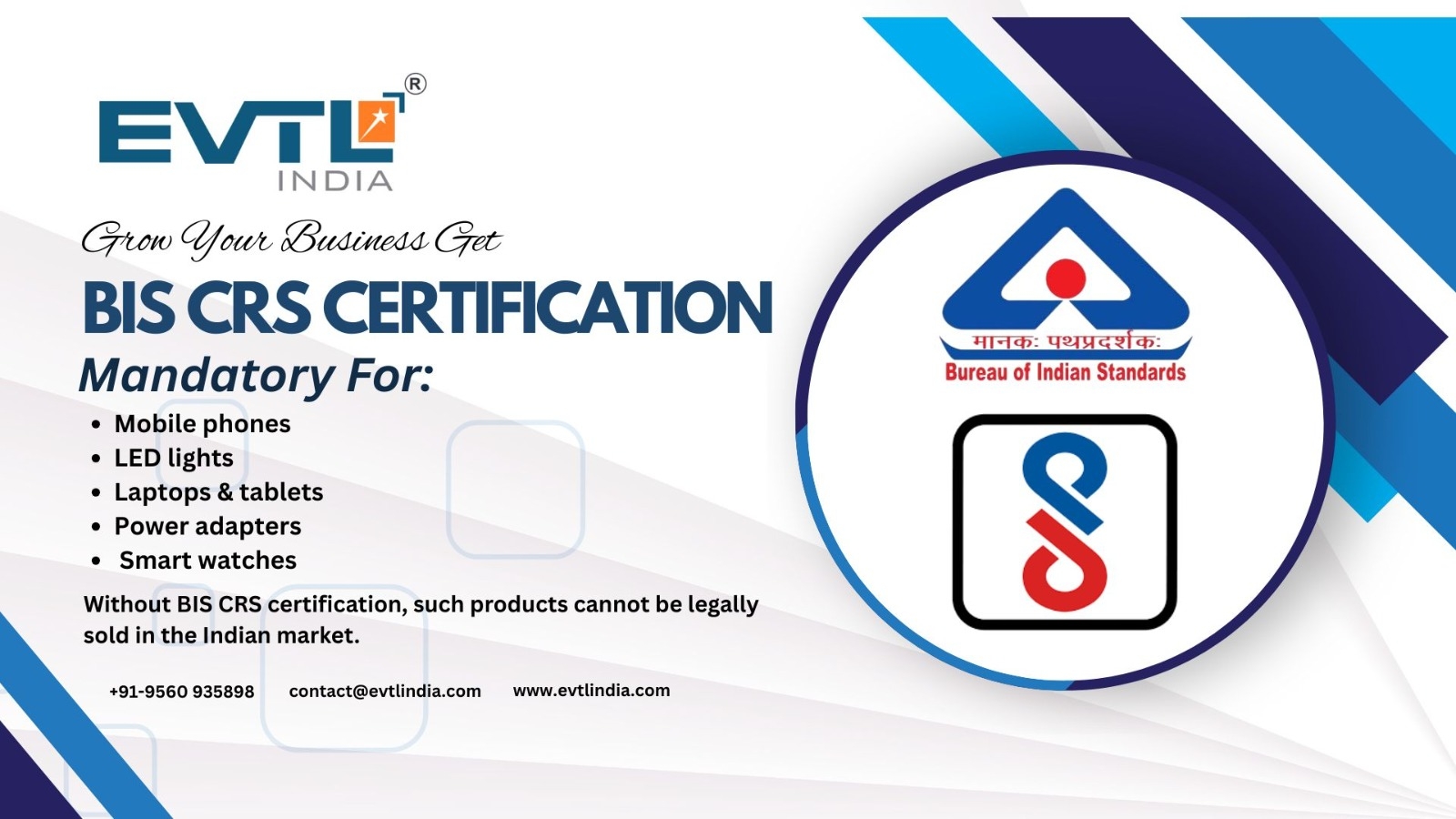India’s electronics market is one of the fastest-growing in the world. To ensure consumer safety and promote quality, the Bureau of Indian Standards (BIS) introduced the BIS CRS—Compulsory Registration Scheme—for certain electronic products. This certification is not just a compliance obligation; it is the gateway to credibility, smooth customs clearance, and seamless product launches in India.
Let’s understand what makes BIS CRS Certification crucial and how manufacturers and importers can benefit from early and proper registration.
The Backbone of Trust in Electronics
In a country where millions depend on electronics for day-to-day tasks, ensuring product safety is non-negotiable. This is exactly where CRS Certification comes in. It ensures that your electronic product meets essential safety and performance benchmarks before it enters the Indian market.
From smartphones, LED TVs, and laptops to adaptors, smartwatches, and Bluetooth speakers—over 70 product categories are notified under BIS Registration for Electronic Products.
Why BIS CRS Certification is a Strategic Move
You don’t just get a registration number. You get recognized as a reliable brand that meets Indian standards. Here's what it brings to the table:
-
Customs clearance without detention
BIS-certified products are prioritized at ports, reducing hold-ups. -
Better trust with Indian consumers
Products with a BIS CRS mark signal quality and safety to buyers. -
Access to online marketplaces
Platforms like Amazon and Flipkart require CRS-registered products to list electronics. -
Avoid penalties or market bans
Non-compliance can result in seizure of products or legal action.
Who Needs BIS CRS Registration?
-
Indian manufacturers of notified products
-
Foreign brands exporting to India
-
E-commerce sellers and OEM partners
-
Startups planning to launch tech gadgets in India
If your product falls under the notified list, CRS Registration is mandatory—regardless of whether you’re a small brand or a global tech giant.
Inside the BIS CRS Registration Process
The registration process may look complex, but with the right guidance, it becomes straightforward:
-
Identify the applicable product category and Indian Standard (IS)
Example: Mobile phones fall under IS 13252 (Part 1): 2010. -
Get product testing done in a BIS-recognized lab
Every batch must undergo compliance testing in India. -
Submit your application with supporting documents
This includes test reports, business registration, brand authorization (in case of OEM), and a factory affidavit. -
Scrutiny by BIS officials
If documents and test results align, your application moves to approval. -
Grant of BIS CRS number
Once registered, your product can bear the CRS mark for Indian sales.
How Long Does BIS CRS Certification Take?
On average, it takes 4–6 weeks if everything is in order. However, delays often happen due to incorrect documentation or unaccredited lab reports. Partnering with a BIS consultant can significantly reduce this timeline.
BIS CRS and Evolving Regulations
The landscape of BIS CRS Registration is constantly evolving. The government frequently updates the product list and testing parameters. For example:
-
Recently, smart speakers and video surveillance equipment were added.
-
The QCO (Quality Control Order) update in 2025 made BIS CRS mandatory for certain wireless modules.
If you're not up to date, you risk non-compliance.
Role of BIS CRS Consultants
Handling BIS procedures alone can be overwhelming. Expert consultants streamline the process with:
-
Accurate documentation and application filing
-
Coordination with BIS labs and authorities
-
Regular updates on QCO notifications and revisions
-
Assistance in label approvals and CRS logo guidelines
If you're a foreign manufacturer, a local consultant becomes even more essential due to mandatory Indian Representative (AIR) requirements.
Cost Breakdown for BIS CRS Certification
Cost components include:
-
Lab Testing Fees – varies based on product complexity
-
Application Fees – as prescribed by BIS
-
Consultant Charges – depends on service scope
-
Label Approval/Design Fees – for BIS logo compliance
For a single model, the average total cost ranges between INR 50,000 to INR 1.5 lakh, depending on the product and applicant type.
Common Mistakes to Avoid During CRS Registration
-
Submitting test reports from non-BIS-accredited labs
-
Skipping label approval before marking the BIS logo
-
Using a single registration for different product models
-
Ignoring the need for Authorized Indian Representative (AIR) for foreign brands
-
Not renewing the registration before expiry
Avoid these, and you avoid major setbacks.
What Happens After Registration?
Once the product is registered, you can:
-
Legally affix the BIS CRS mark on your product and packaging
-
Manufacture, import, and sell across India
-
Expand into B2B, retail, and online markets with confidence
Remember, BIS regularly monitors products in the market. So even after registration, quality control and compliance remain ongoing responsibilities.
Conclusion: Certification is Not Just a Requirement—It’s a Market Strategy
EVTL India is one of the leading BIS Consultant in India, helping manufacturers obtain their BIS licences hassle-free. Today’s consumers are informed. They check quality marks. Distributors want assurance. Government portals demand compliance.
BIS CRS Certification is more than a tick in a box—it’s a badge of trust. Whether you’re a new electronics startup or a global tech firm entering India, staying compliant means staying competitive.
Need help navigating the process? EVTL India offers expert consultancy services for hassle-free BIS CRS Registration—from testing to approval and renewal.


